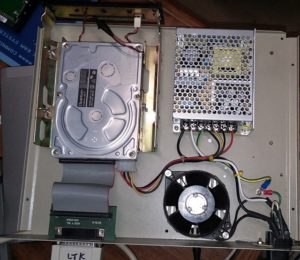If you had a Commodore 64 in the 1980s, odds are the one peripheral you really wished you could have was a Lieutenant Kernal Hard Drive from Fiscal Information/Xetec. Bringing 20 megabytes of blindingly-fast storage to the system, the Lieutenant Kernal (LTK for short) was the storage system of choice for C64 BBS operators everywhere. The LTK also brought the power of the minicomputers of the day to the desktop with its integrated DOS and database technology. 100 times faster than the standard storage option of the day, the LTK also allowed attaching multiple devices to the bus for an aggregate storage capacity of 330 megabytes. Compare this to the 170 kilobyte capacity of the 1541, and it shouldn’t be hard to see why the LTK was so successful.
In spring of 2017, a friend was clearing out his basement, and gave me a bin of odd hardware he was throwing away. In the box were two Seagate ST296 SCSI drives, a Xetec Lieutenant Kernal host adapter, a Xetec drive enclosure, and a handful of cabling. Immediately, it became clear that the drives were damaged. One wouldn’t spin up at all, and belched forth an impressive amount of smoke as soon as it was connected to power. The other would spin up, but the system would immediately lock up due to the mismatching serial numbers of the drive and host adapter. The drive enclosure had a bad power supply. After some online research, and discussions with friends, however, I was able to use the host adapter with a newer drive and PC power supply.
This left the two Seagate ST296 drives and the drive enclosure.
The enclosure was a simple thing to fix, there are much more efficient power supplies now and the voltage ratings are standard for hard drives, so the only real issue was footprint. I found the MeanWell RD-65A to be a suitable replacement, and after some cleanup of the original wiring, this was the result:

LTK Enclosure PSU Replacement
The drives were another issue. I knew one had been used as the storage system for a local BBS (The Basement BBS in Cincinnati), so I couldn’t just toss it out without trying to recover some of that history. (more on this later)
At this point, some basic project goals started to form.
- Find a way to use the working ST296 with my host adapter so it could be archived.
- Remove the ridiculous serial-number protection from the system.
- Write some basic tools for interacting with these devices.
So what is the LTK, really – a (very) simple SCSI interface and drive. A host adapter plugs into the expansion port of the C64 and handles all of the communication betweeen the C64 and SCSI drive. There are no special electronics in the drive unit itself. It is worth mentioning that the 25-pin bus is not compatible with other external SCSI drives, but this is simply due to Xetec re-arranging the pins to prevent the use of cheaper SCSI enclosures.
Up next, digging into the ROM…